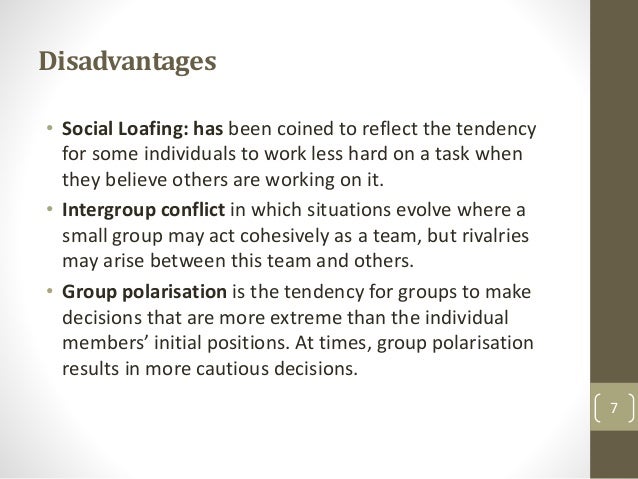

In-group members can attempt to enhance the group's social status by collectively working to improve their situation. Im wondering if there is a term for the phenomenon where an individual subconsciously buys into societys stereotypes about a group that they belong to and. Another option is to compare the in-group to a different out-group-specifically, an out-group that has a lower social status. This can be accomplished by choosing a different dimension on which to compare the two groups, or by adjusting value judgments so that what was once thought to be negative is now considered positive. In-group members can enhance the social standing of their existing group by adjusting some element of the between-group comparison. Of course, this won’t alter the status of the group, but it can alter the status of the individual.

When an individual does not view her group favorably, she can attempt to leave the current group and join one with a higher social standing. Kintsch, E., Steinhart, D., Stahl, G., LSA Research Group, Matthews, C.
#Group psychological phenomena series#
This led to a series of studies that Tajfel and his colleagues conducted in the early 1970s that are referred to as minimal-group studies. Use of latent semantic analysis for predicting psychological phenomena: Two. This module explores important considerations for evaluating the trustworthiness of such claims by contrasting between scientific. Social identity theory arose from Henri Tajfel’s early work, which examined the way perceptual processes resulted in social stereotypes and prejudice. We are bombarded every day with claims about how the world works, claims that have a direct impact on how we think about and solve problems in society and our personal lives. Phenomena A phenomenon (plural, phenomena) is a general result that has been observed reliably in systematic empirical research. Explain why there are usually many plausible theories for any set of phenomena. Explain the purposes of scientific theories. In-group favoritism can result in negative and discriminatory outcomes, but research demonstrates that in-group favoritism and out-group discrimination are distinct phenomena, and one does not necessarily predict the other. Learning Objectives Define the terms phenomenon and theory and distinguish clearly between them.Generally, individuals wish to maintain a positive social identity by maintaining their group’s favorable social standing over that of relevant out-groups.Social identity theory is built on three key cognitive components: social categorization, social identification, and social comparison.Social identity theory, introduced by social psychologists Henri Tajfel and John Turner in the 1970s, describes the cognitive processes related to social identity and how social identity impacts intergroup behavior.Further research indicates that a group is just as likely to provide help as an individual, devaluing Darley and Latane’s theory. Group Psychology and the Analysis of the Ego. The Standard Edition of the Complete Psychological Works of S. Finally, we show how a simple mechanism based on two well-established psychological phenomena. The term was first used in 1972 by social psychologist Irving L. In many cases, people will set aside their own personal beliefs or adopt the opinion of the rest of the group. Plus, many of the witnesses did in fact call the police. Group Psychology and the Analysis of the Ego. Groupthink is a psychological phenomenon in which people strive for consensus within a group. However, in 2007, the New York Times admitted it exaggerated the number of witnesses in the Genovese case. Cognitive dissonance is basically this phenomenon whereby we have a natural. Reductionist and materialist approaches to the study of psychological phenomena led psychology to look for explanations in terms of physiological properties psychological properties evolution social factors 2. The group has a weak sense of responsibility to intervene. Since then its become one of the most influential theories in psychology. Implications for Group Psychology Research and Practice 207 Nathaniel G. In an experimental study, one group called the experimental group, it is the one that will be.

They explain several reasons a group is less likely to help, such as groupthink, diffusion of obligation, and ambiguity. To study psychological phenomena, we use experimental studies. The concept proposes that an individual is more likely to help a victim than a group. The shocking revelation prompted social psychologists John Darley and Bibb Latane to examine the phenomenon, with the dup coming up with the bystander effect. Two weeks later, the New York Times published an article stating that 38 witnesses refused to phone the police or help Genovese.

On March 13, 1964, Winston Mosley murdered 28-year-old bartender Kitty Genovese outside her apartment.


 0 kommentar(er)
0 kommentar(er)
